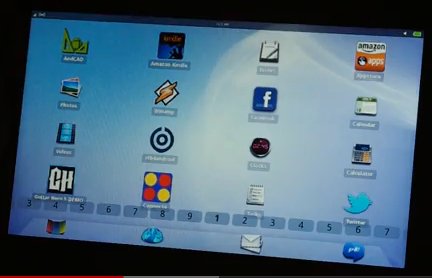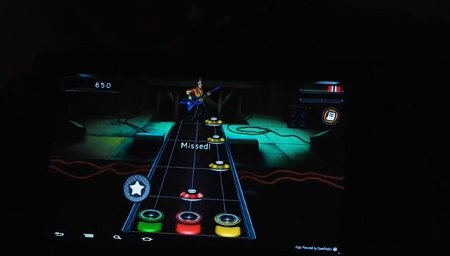Android compatibility layer launches first on MeeGo
Sep 22, 2011 — by Eric Brown — from the LinuxDevices Archive — 4 viewsOpenMobile has demonstrated OEM-focused technology that permits any Android app to run on MeeGo, with versions planned for Linux, Bada, WebOS, and Windows, Symbian, and QNX. OpenMobile's Application Compatibility Layer (ACL) was shown in a video running Android apps and quickly switching between MeeGo and Android environments on a MeeGo tablet.
Even before Nokia pulled the rug out from under the Intel/Nokia-backed MeeGo platform in February when it shifted its smartphone strategy to embrace Windows Phone, efforts were underway to solve the mobile Linux operating system's greatest challenge: the lack of apps.
In early February, for example, Myriad Group AG announced a Dalvik virtual machine (VM) claimed to let Android apps run on non-Android platforms. Myriad posted a video showing Myriad Alien Dalvik running Android apps on a Nokia N900 tablet running MeeGo, and said the software would be available for MeeGo later this year. Since then, there's been no update, except for a May announcement that the company is pushing the technology toward automotive infotainment devices.
 Now OpenMobile has unveiled a rival Application Compatibility Layer (ACL) stack, which similarly claims to harness Google's runtime environment and Dalvik VM to bring Android compatibility to MeeGo. ACL for MeeGo is claimed to perform "seamlessly" on MeeGo smartphones, tablets, e-readers, connected TVs, and in-vehicle infotainment (IVI) devices.
Now OpenMobile has unveiled a rival Application Compatibility Layer (ACL) stack, which similarly claims to harness Google's runtime environment and Dalvik VM to bring Android compatibility to MeeGo. ACL for MeeGo is claimed to perform "seamlessly" on MeeGo smartphones, tablets, e-readers, connected TVs, and in-vehicle infotainment (IVI) devices.
Right now, there are very few commercially available MeeGo devices in any of these categories, aside from the Nokia N9 smartphone, Nokia's first and last MeeGo device. That doesn't really matter, however, since the technology is aimed at OEMs, not at end users.
 Meanwhile, the company plans to bring the technology to generic Linux (ACL4Linux) devices, as well as Bada and WebOS. In addition to these operating systems, all of which have been demonstrated to run on a Linux kernel, the technology can also be applied to Symbian and QNX, which is used in Research in Motion's PlayBook tablet (pictured). RIM has confirmed that it plans to bring Android compatibility to the PlayBook later this year, however.
Meanwhile, the company plans to bring the technology to generic Linux (ACL4Linux) devices, as well as Bada and WebOS. In addition to these operating systems, all of which have been demonstrated to run on a Linux kernel, the technology can also be applied to Symbian and QNX, which is used in Research in Motion's PlayBook tablet (pictured). RIM has confirmed that it plans to bring Android compatibility to the PlayBook later this year, however.
A Windows version is also planned, says the company. In fact, OpenMobile has posted ACL data sheets only for Windows, MeeGo, and HP's Linux-based WebOS. There's no mention of Windows Phone, per se, although the claim is repeated here about supporting everything from smartphones to IVI devices.

Android apps displayed on MeeGo tablet using ACL
Source: OpenMobile
The demo shows a quick switch between MeeGo and Android environments, which technically fulfills OpenMobile's promise that the technology can "run native MeeGo Apps side by side with Android Apps." The demo then shows various Android apps running with what appears to be good performance. ACL runs on MeeGo "with zero latencies," and will not drain device resources such as power and memory, claims the company.

ActiVision's Guitar Hero Android app running on MeeGo
Source: OpenMobile
All major third party app stores are supported with ACL, says OpenMobile. This would suggest that Android Market is not.
Instead of using virtualization or emulation techniques, ACL integrates the Android application runtime into the native target OS, says OpenMobile. Security and sandboxing are provided, "eliminating any resource drain that is always required by alternative dual boot solutions," and MeeGo apps "never see or touch any of the Android environment," claims the company.
ACL is said to offer integrated task management, as well as compatibility with Android's inter-process communication framework. In addition, it offers a full set of Java base classes and Android-specific classes and APIs, and supports Android API Level 4+, NDK6+, says the company.
It remains to be seen whether Android compatibility layers will be enough to save struggling Linux-based mobile operating systems such as WebOS and MeeGo, both of which may be up for grabs as HP and Intel reconsider their respective strategies. At the recent Intel Developer Forum conference, Intel denied rumors it was selling off its MeeGo assets to vendors such as Samsung, but it also made a pact with Google that it hopes will bring Android to Intel Atom-based smartphones next year. As for MeeGo, the IVI market appears to be its best hope, according to Intel.
Meanwhile, the CyanogenMod modding community has made progress porting Android to HP's discontinued WebOS-based TouchPad tablet.
YouTube
demo of ACL for MeeGoSource: OpenMobile
No availability was announced for ACL for MeeGo, but it appears as if it may be available now to selected OEM partners in the preliminary 0.9 version. More information may be found in this ACL announcement posted on MeeGoExperts and on OpenMobile's ACL product page.
This article was originally published on LinuxDevices.com and has been donated to the open source community by QuinStreet Inc. Please visit LinuxToday.com for up-to-date news and articles about Linux and open source.